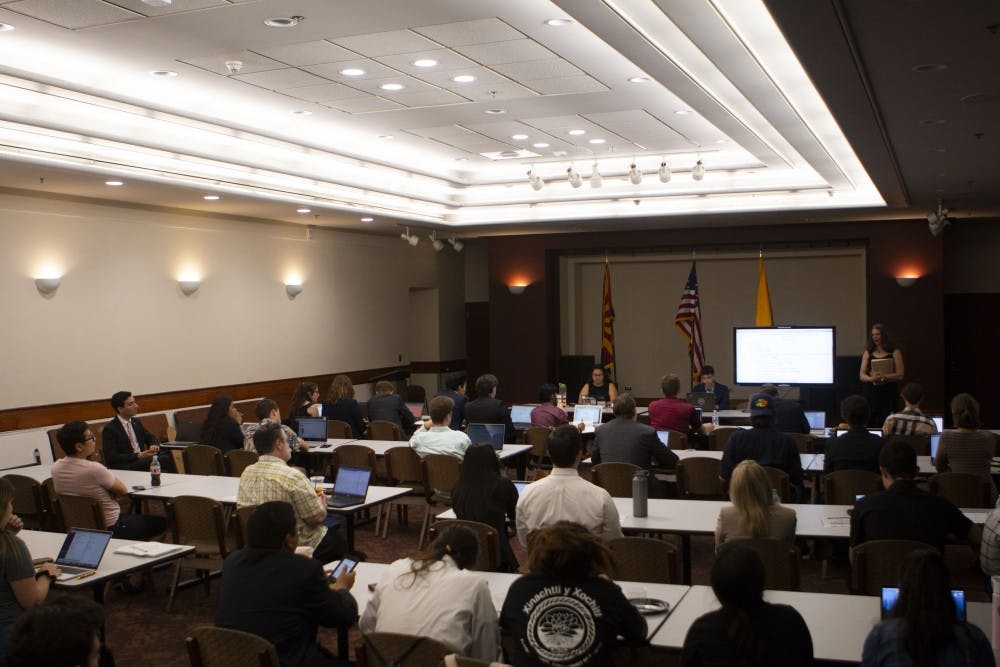On Nov. 2, 2018, the Undergraduate Student Government Downtown senate passed a resolution that opposed changing the definition of gender under Title IX to "a biological, immutable condition determined by genitalia at birth," thereby excluding transgender students in the definition.
The USGD resolution responded to a leaked memo from the Department of Health and Human Services revealing that President Donald Trump's administration was considering redefining gender.
Read more: USGD responds to Trump's proposal to define gender
Around the same time, USGD informed the other campuses' student governments of the resolution it introduced, sparking the other senates to follow suit.
Natasha Snider, the Undergraduate Student Government West Senate President and a senior double majoring in forensic science and biology, explained that USGW passed the same resolution as a show of solidarity with the other USG bodies.
"It came to our attention from the Downtown campus first … they actually emailed us to notify us they had proposed something," Snider said. "We edited (the resolution) a little bit and approved about the same thing just to show we’re unified across USGs, but also for our student body here at West."
The resolutions on defining gender under Title IX were not the first, nor the last, time during the 2018-19 school year that USG has weighed in on controversial policies, both at the state and federal level. Student government at ASU has increasingly been more involved in weighing on hot-button issues, a shift that has received both support and criticism.
This year, both Undergraduate Student Government Tempe and USGD introduced resolutions against House Bill 2523, which would have allowed employers to pay full-time college students less than the state's minimum wage.
Read more: Bill allowing students to be paid below state minimum wage faces pushback
USGD also passed a resolution opposing Senate Bill 1046, which, if passed, would have prevented voters who fill out mail-in ballots to drop them off at polling booths on Election Day.
While Snider said she believes that measures like the resolution on Title IX show that "no matter what’s going on politically, we are unified as West students" – a sentiment that some members of USG on other campuses have expressed – USG senators throughout the year have argued that having USG comment on policy does more to divide the student body than unify it.
USGT senator Kyle Cloud, a senior majoring in electrical engineering who is one of the most vocal opponents against USG resolutions that comment on external policy changes and other outside matters.
"I would not ask USG to weigh in on any political question outside of USG's own internal business," Cloud wrote in an emailed statement responding to whether any federal or state matter would warrant involvement from USG.
Still, others say that passing these kinds of policies are part of USG's job to hear students' opinions on policy and student governments should write legislation that reflects the student body.
"Students need representation, they need advocates who will fight for their needs," USGD President Aly Perkins, a senior majoring in public service and public policy, wrote in an emailed statement. "If the student voice wasn't brought to legislators or administration, who is to stop them from taking advantage of us?
Jackson Dangremond, the president of USGD from 2016 to 2018 and a senior majoring in health entrepreneurship and innovation, explained that during his time in USGD, the organization would consider writing resolutions if a change in policy would impact ASU students, later voting on the resolution based off of student input.
"My personal philosophy is that we would respond to issues that have the potential to impact student well-being," Dangremond said. "We collected student feedback to see what side of the issues our students fell on, or supported, and then from there we took that information and determined the way in which the senate would vote."
This is the same process that USGD currently uses to propose resolutions, Perkins said.
She said that although some years may see more proposed resolutions, an influx in proposals doesn't mean that it's a new trend for USG to weigh in on policy.
"To my understanding, putting out resolutions in summation of the student voice has been a consistent priority throughout the years," Perkins wrote in an email. "Some years see more stances taken than others, just due to the policy changes proposed, but that doesn't mean that it holds less importance during the slower years."
Dangremond said that although there has not been a drastic change over the years in the number of resolutions proposed, there is a difference in the policy they respond to.
"There definitely was an increase at the federal level following the election of Donald Trump in terms of things we needed to respond to," he said. "Prior to that, most of the things USG was responding to were taking place at the state level."
Dangremond said that the resolutions alone are not enough from USG, but they are a good starting point.
"I think the resolutions within themselves are a formalized response, and a guide for action," he said. "I don't think that they should be the last action that USG takes."
In addition to the resolutions, Dangremond thinks that USG should encourage students to attend committee sessions at the state legislature and Arizona Board of Regents meetings.
This push for civic engagement became a focus of USG executive ticket campaigns this election cycle.
Hanna Salem, the USGT president-elect and a junior studying public service and public policy, ran on a campaign to promote student involvement in campus organizations and encourage students of all political ideologies to vote.
"Civic engagement is not driven by partisan issues," Salem said in an email. "Civic engagement is meant to inspire and empower individuals to let their voices be heard in their communities and in local, state and national government."
Her campaign platform included her plan to create a Civic Engagement University Board and Committee, with the goal of increasing voter turnout of ASU students to 80% for the 2020 elections.
"Students will be trained on how to properly register others to vote, collaborate on events, and lay the foundation for the 2020 election," her campaign website said. "We strive to find solutions to lowering the waiting times at the ballot center on campus, informing students on ALL elections and candidates, and raising the voter turnout rate."
The executive ticket on the Downtown campus held a similar position in regards to civic engagement.
Yasmin Alvarado, the USGD president-elect and a junior majoring in public service and public policy, promoted connected students with politicians and public officials.
According to the Alvarado campaign's Instagram, they hope to "ensure that student feedback and USGD’s Senate resolutions are heard at the administrative and legislative levels."
But for those that criticize this kind of action from USG, weighing in on policy issues will inherently exclude the thoughts of some students, and should be avoided.
"To express one position on behalf of the entire student body is to unjustly reduce the student body to a political monolith, ignoring the healthy diversity of opinions and experiences among ASU students," Cloud said in an email. "It is an arrogant abuse of power."
Just because USG has made comments in the past about external policy changes, doesn't mean that it should continue doing so, he said. To Cloud, USG should be focused on internal issues that are directly under its jurisdiction.
He has spoken out against USGT resolutions concerning federal and state policies before, including the resolution opposing the possible change to the definition of gender under Title IX.
In a statement he read to the senate while debating the bill, Cloud said that Carla Naranjo, the USGT senator who proposed the resolution, should not be taking up this issue with the student government, as it is not its role to shape federal policy.
"If the senator from CLAS fears for students' rights, if the silence of Title IX on gender identity frustrates her, I invite her to take it up with Congress," Cloud said. "This resolution is inappropriate and unbecoming of an organization seeking to represent all ASU students."
However, Naranjo felt her legislation was necessary to fulfill her role as a USG senator, by addressing an issue that would impact her LGBTQ+ constituents.
“The full scope of the USG Senate is to address any issues that affect students of the Tempe Campus, ranging from internal USG affairs and legislation that affect students’ abilities to succeed at ASU,” Naranjo wrote in an email. “Passing a Senate Resolution in response to federal policies is definitely within USG’s jurisdiction.”
Perkins said she disagreed that what student government bodies like USGD are doing is political. Instead, this kind of work is crucial in its efforts to serve the student body, she said.
"USGD takes stances on policy issues rather than political ones," she wrote. "What people may not understand is that there is a difference between being nonpartisan and not involving themselves in advocacy efforts at all."
Editor's Note: This story was updated at 12:23 p.m. on July 8, 2019 to include a statement from Carla Naranjo.
Reach the reporter at krquaran@asu.edu and follow @kiaraquaranta on Twitter.
Like The State Press on Facebook and follow @statepress on Twitter.





